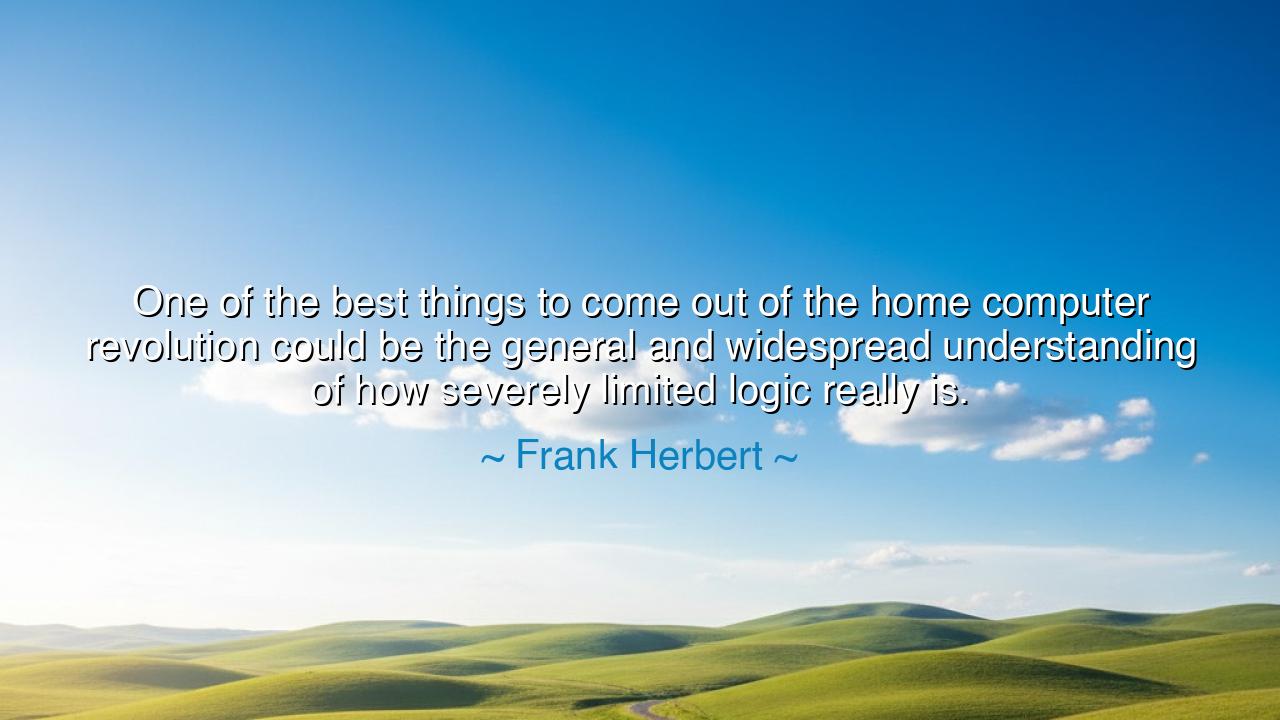
One of the best things to come out of the home computer
One of the best things to come out of the home computer revolution could be the general and widespread understanding of how severely limited logic really is.






When Frank Herbert wrote, “One of the best things to come out of the home computer revolution could be the general and widespread understanding of how severely limited logic really is,” he was not merely speaking of machines or circuits — he was speaking of the human condition. Beneath the gleam of technology, Herbert saw the reflection of something older and more profound: the struggle between the mind and the soul, between the rigid order of logic and the boundless mystery of life. His words, prophetic in tone, are both a warning and a revelation — that even as mankind builds thinking machines, it must remember that not all truth can be computed.
To understand Herbert’s meaning, one must remember the era from which his insight arose. The world was entering the dawn of the computer age, a time when logic reigned supreme. Machines promised precision, speed, and mastery over chaos. Yet Herbert, the author of Dune and a philosopher of human nature, looked deeper. He saw that the more humans trusted logic alone, the more they risked forgetting intuition, emotion, and mystery — the very forces that make us human. The “home computer revolution”, he suggested, would not simply give us tools of convenience, but a mirror to our own limitations. It would reveal that logic, though powerful, is a narrow lens through which to view the vastness of existence.
For logic, noble though it is, walks only on straight lines — and life moves in circles, spirals, and storms. Logic can weigh data, but it cannot measure love. It can simulate a sunrise, but it cannot make you weep for its beauty. The computer, that cold servant of reason, can process infinite equations and still fail to understand the trembling of a mother’s heart or the awe of a poet before the sea. Thus, Herbert foresaw that through our intimacy with machines, we would awaken to what they cannot do — and in that awakening, perhaps, rediscover the depths of our own spirit.
This truth has been lived many times before in the history of the human race. Consider Socrates, who in his dialogues dismantled the proud logic of his peers, showing them that reasoning alone leads to endless contradiction if not guided by humility and moral awareness. His wisdom was not in logic’s perfection, but in recognizing its limits. “I know that I know nothing,” he said — a statement that logic would call absurd, yet wisdom calls divine. Similarly, Albert Einstein, father of the modern scientific age, declared that “imagination is more important than knowledge.” Both men understood what Herbert would later echo: that logic is a tool, not a truth.
Herbert’s vision also carries a subtle irony. The computer, born from pure logic, becomes the very thing that exposes logic’s boundaries. When humanity tries to make a machine think, it is forced to confront the difference between thinking and understanding, between calculation and consciousness. No matter how advanced our devices become, they remain reflections, not souls. They can mimic emotion, but not feel it; they can predict outcomes, but not choose with compassion. In this sense, the “revolution” of machines is also a revolution of awareness — a rediscovery of the immeasurable qualities that define what it means to be alive.
Therefore, Herbert’s words are not cynicism, but awakening. He urges us to see that logic, without wisdom, becomes tyranny, and that the mind, without the heart, becomes a machine. To live fully, one must balance precision with wonder, order with mystery. The home computer may teach efficiency, but life demands empathy; it may model intelligence, but life calls for understanding. The true revolution, then, is not technological — it is spiritual. It is the moment humanity realizes that no code, no algorithm, no chain of logic can ever contain the infinity of the human soul.
So, O seeker of wisdom, let this be your lesson: use logic, but do not be ruled by it. Let reason be your servant, not your master. When you stand before the glowing screen or the demands of reason, remember that what gives life meaning lies beyond computation. Feel before you analyze, listen before you conclude, and love before you define. For the wisest of all is not the one who reasons best, but the one who knows when to stop reasoning and simply behold.
Thus, Frank Herbert’s words echo across generations: that logic is the tool of the mind, but mystery is the language of the soul. The computer may one day surpass our intelligence, but it will never surpass our humanity. And perhaps, when that truth is finally seen, man will not fear the machine, but thank it — for showing him the limits of logic, and the boundless depth of being.






AAdministratorAdministrator
Welcome, honored guests. Please leave a comment, we will respond soon